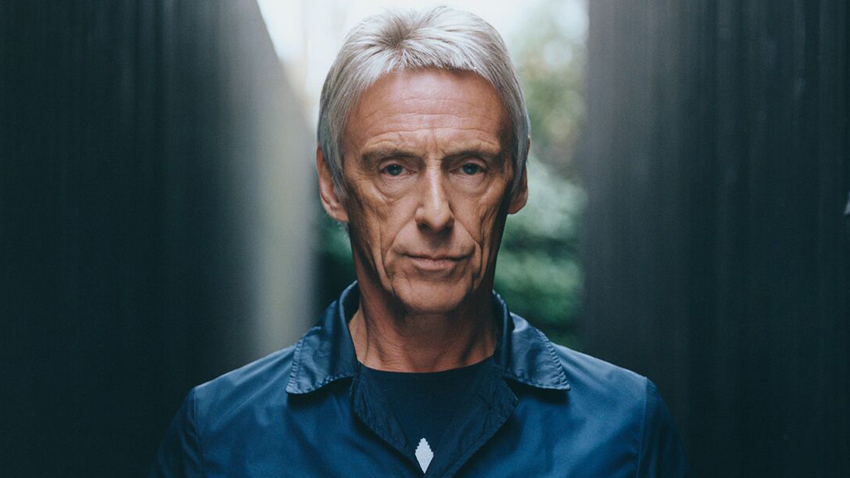Paul Weller’s Ever Changing Moods

PAUL WELLER returns for three exclusive Sydney shows. PARIS POMPOR gets on the blower with The Modfather, finding him in a good mood and happy to talk.
There’s a terrific song on The Style Council’s second LP, 1984’s ‘Café Bleu’, called ‘My Ever Changing Moods’. Despite the title, it doesn’t detail emotional mania or a prickly personality. Instead, like most Weller lyrics, it gives a glimpse inside the mind of a prolific and accomplished songwriter alongside social commentary and varying degrees of political bile. There is something about that song title that sums up Weller’s career though: always shifting. In 1982 at the height of his mod-punk power trio The Jams’ success, the singer pulled the plug and confounded a legion of working-class fans with a new group called The Style Council. Swapping that incisive and incursive guitar sound for something far more Bensonesque, his new group delivered some of Weller’s most biting political manifestos, albeit in fresh musical settings where everything from blue-eyed soul, electro, hip hop, jazz and lush orchestra suites fused with imagery from glossy globetrotting men’s magazines. Still agitating, this time more stylishly, over the next six years Weller gave the middle finger to anyone who dared shout: “kick out the style/bring back The Jam.”
Despite some misdirected (and rather late in the case of Tears For Fears) outrage, The Style Council picked up a new legion fans, converted many of the old Jam ones and topped the charts around the world with a string of memorable singles. But again the plug was yanked and everything went down the gurgler. By the end of the ’90s Weller found himself without a record contract. With tenacity – plus a fearless managerial father at his back – in 1992 Weller launched his solo career with a self-titled album and ever since, has largely gone from strength to strength, with everything from ballads and searing mod-rockers, to psychedelic trip hop workouts. Throughout it all, is a love for African America soul/r’n’b. You can hear it in the latest album, which continues the evolution of his ever changing moods, fusing the melodic knowhow of the Council and the gut-punch of The Jam.
It could be argued Weller is one of a handful of contemporary artists who has barely made a questionable move or released a dud record across a career spanning 40 years and five decades. He remains stylish, without much regard for what’s fashionable, and his voice and songwriting continue maturing. Fast forward to 2017 and the 59 year-old is in no mood for slowing down. This year alone Weller has released three projects: Mother Ethiopia/Street Rituals, recording projects with Stone Foundation; the soundtrack for British film Jawbone; and his 13th solo album, A Kind Revolution. Plus he tells me there’s already a 14th solo record written, which should be recorded by xmas. Below are excerpts from our conversation, kicking off with him talking about a recent collaborative album with the Stone Foundation.

PW: [The Stone Foundation recording] was really quick, we just hit it off. Three days for half the album and another three days later on. There’s a lot of joy in the music. You can hear it.
PP: You also produced the Stone Foundation record right? ‘Producer’ is a nebulous term. Some are very hands on, others waft in and out of the studio. What kind of producer are you and did you enjoy the process?
PW: I was happy to do it, it was painless… [and] a lot of fun. I don’t really know what it takes to be a producer. I would just make suggestions, observations maybe about the arrangement, or changing little bits here or there, but my thing is: just try it. Try whatever really. Certainly in recent years, that’s been my style of writing and producing.
PP: You choose to record in your own studio these days, in Woking, Surrey outside of London, where you grew up. What’s the set up like there?
PW: I’ve had it nearly 20 years, but it’s only been in the last 10 years, maybe even less, that we’ve really got the sound together. The more we’ve worked there, the better the sound’s gotten. It’s just a nice little studio, it’s not state of the art. I can’t do any of the technical stuff, no idea at all. No interest in it.
PP: I know you’re working quickly these days, but one advantage of having your own band studio must be the luxury of being able to spend months in there experimenting on a record. That’s a rare thing these days for bands to enjoy, compared to say the ’70s and ’80s.
PW: In London, if not in the UK, most studios have gone to the wall. There are very very few of them left. There are loads of little mixing suites, but there’s not really that many spaces any more for a whole band to set up. It’s a shame man. I don’t really think it’s progress, but it’s just the way it is. All those beautiful old acoustic rooms, like Olympic Studios [in Barnes, where everyone from Jimi Hendrix and Led Zeppelin to The Beatles once recorded] are all gone. I guess with the advent of digital recording. You can record anywhere now, you know?
PP: Has something been lost sonically? Can you hear the difference in albums recorded in these small Pro Tools-like set-ups compared to the analogue ones of old?
PW: I could hear it up until a few years ago, but whatever it is, in the last two or three years [digital] has just gotten so much better. There are so many sort of analogue plug-ins and stuff, it’s really hard to tell half the time. It sounded very flat before that, but I’m kind of hard-pressed to hear the difference [now].
PP: Is the process of recording still a buzz for you?
PW: I love recording man, because I love the thing of going in in the morning – sometimes with a song, sometimes with just a few ideas – and then chiselling away. By the evening… this songs starts to form. You sometimes can’t quite remember how you got to it, it just happened over the course of a day or two days or whatever it may be, but all of a sudden there’s this living thing in front of you. That’s a really magical, wonderful thing I think. No matter how many times I do it, I always find it amazing.

PP: Even though you’re pretty prolific these days, there’s that lag between finishing a recording and people hearing the results, right?
PW: Yeah, definitely. By the time it comes out, I’ve already started on the next project. Obviously playing them in front of people is the real pinch… It’s the test of the song in some ways.
PP: I don’t think I want to suggest you’ve “improved” as a songwriter, since you wrote some pretty amazing tunes as a young man, but do you yourself feel you’ve become better at writing?
PW: Oh bless ya. Yeah, I definitely do. I think my writing’s a lot more consistent now. There are tunes from my youth that still stand up, but to me personally [it’s] more my contemporary work. I don’t know, maybe I have more ideas. I think I’m a lot more open and receptive to writing and to seeing where the music goes. I don’t really have to think about, ‘what’s the direction?’ It kind of forms. That direction forms itself in a sense.
PP: Are you conscious that your cannon of songs is an intensely personal soundtrack for many fans and that some people have been following you since they were teens? How does that make you feel?
PW: I think it’s wonderful there’s that life-long connection, it’s pretty amazing. We’ve all grown together. We’ve all been on this on journey. I meet loads of those people. They’re in there early 50s maybe, who were just kids [when I started].
PP: There are songs from The Jam that mean a lot to people, and you’ve penned some poignant political lyrics – like those you wrote for The Style Council’s ‘A Stones Throw Away’ – which served as educative wake-up calls for a generation. Then there are soul-bearing solo tunes like ‘You Do Something To Me’ from early album ‘Stanley Road’. With that tune in particular, did you know at the time you’d written something quite beautiful that would resonate with many?
PW: I didn’t at first. I thought there was something good about it, but I remember when I was doing some demos when I first wrote it and I was almost a little too embarrassed by it. I thought it was a little too sentimental, or saccharin. It wasn’t until we finished it that I saw the beauty in it. Maybe because it felt sort of naked, the words and the simplicity of it. I took a while to see its value. I’m glad I saw it through, because it’s a big tune for people. I’m always amazed by that. People always seem to react to that tune.

PP: Are you yourself attached to all of your songs?
PW: A lot of them I’ve forgotten to be honest with you. I’m not in any way trying to sound blasé about it, but I don’t even remember half the songs I’ve written because I’ve written hundreds literally. It’s normally stuff I’ve written in recent times that I remember best. And more than that really, if I’m really honest, I’m thinking about the next record… Some of [my songs] mean something to me. Some mean an awful lot. Some I can see myself in different stages of my life, my thinking, my thought process. That’s quite an interesting thing to see your progress, or your decline or whatever. And some are just songs. I might have had to fill a B-side or do two more tracks for the album, so maybe dashed some songs off.
PP: So how do you chose what will go into the set list for shows like the Sydney Opera House ones, given there’s a huge back catalogue?
PW: We’ll just try and balance it out. Obviously I’m going to play some new stuff because that’s where my heart and head is, but we’ll play old songs. We play stuff from like Stanley Road – that’s an old album, that’s over 20 years or something. Time’s marching on. Songs from the ’90s and the noughties are old.”
PP: And then there’s the ’70s and ‘80s.
PW: I play some of The Jam songs and The Style Council songs, it’s a good mixture and a good balance of new and old.”
PP: Do you chose songs based on what you enjoy singing the most?
PW: Yeah. The singing and playing. There has to be something going on there for me to be attached to it, to do it justice. We’ve tried doing different old songs and I just don’t feel them. If I can’t sing it with any conviction, there’s not really much point in doing it.”
PP: I read somewhere that you had a fear of flying, which is why we didn’t get to see you much in Australia early on, but you’ve been back a few times in recent years.
PW: I went to see a therapist type person, or a hypnotist. Whatever he did, it did the trick. Flying don’t bother me anymore. The older I get the less scared I get.
PP: Did the hypnotist work for anything else? Kicking the smoking habit maybe?
PW: No it didn’t work at all. The first thing I wanted when I got out of the office was a cigarette.
PAUL WELLER plays the Sydney Opera House on January 27, 28 and 29, three ‘in-the-round’ style performances. BOOKINGS HERE Weller’s latest album ‘A Kind Revolution’ is out now.








